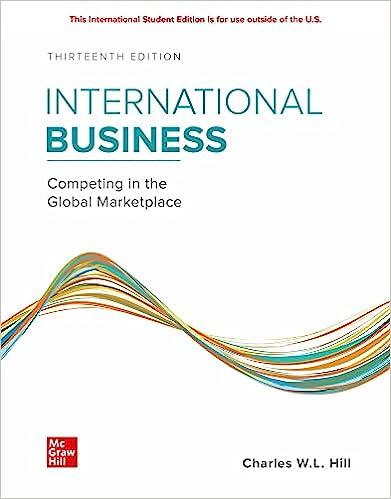Where was Red Bull founded? Many people in the United States and other countries think Red Bull
Question:
Where was Red Bull founded? Many people in the United States and other countries think Red Bull is a product to their own country because the company does such a fantastic job of marketing the brand. Red Bull also plays up the amazing energy, go-getter attitude, and fun risk taking that the brand symbolizes in most things they do. In almost a literal sense, “Red Bull gives you wings,” as their slogan says. To support the company’s international strategy, Red Bull hosts a number of extreme sporting events around the world. This includes the Red Bull Indianapolis Grand Prix in the United States, the Red Bull Air Race in the UK, the Red Bull Soapbox Race in Jordan, the Red Bull Cliff Diving World Series, the Red Bull Air Race, Red Bull Crashed Ice, and stand-out stunts such as the Stratos space diving. But there also many other global strategic placements engineered by the Red Bull brand.
The answer to the opening question is that Red Bull is from Austria, although saying it is an Austrian–Thai company is also true. In 1984, Austrian entrepreneur Dietrich Mateschitz and Thai businessperson Chaleo Yoovidhya founded Red Bull GmbH. While working for German manufacturer Blendax (later acquired by Procter & Gamble), Mateschitz traveled to Thailand and met Chaleo, owner of TC Pharmaceutical. The two struck a cord and eventually started Red Bull a couple of years later. Today, Red Bull is viewed as one of the world’s top companies because of its international business strategy, in particular its international marketing strategy (keep that in mind for Chapter 18, the Global Marketing and Business Analytics chapter). Worldwide, Red Bull also has the highest market share of all energy drinks, with more than 6 billion cans sold annually (that is almost one can for every person worldwide).
Why is it called Red Bull? The name actually plays up its founders’ backgrounds. In Thai, daeng means red, and krating is the name of a large wild bovine in Southeast Asia, called a gaur in formal English. A gaur, however, is also informally referred to as a bull. Red Bull is sold in a tall and slim blue-silver can, while Krating Daeng is in a shorter gold can. To capture the historical context for this case, Krating Daeng was the instigator and became the basis for the creation of Red Bull. While Red Bull is the bestselling energy drink in most parts of the world, both Red Bull and Krating Daeng are sold worldwide (in about 165 countries). Red Bull is viewed as an Austrian company, and Krating Daeng as a Thai company. Krating Daeng was founded by Chaleo; when Mateschitz met Chaleo, they created Red Bull as a spinoff and modified the ingredients in the drink to suit Western tastes.
In many ways, Red Bull’s event marketing strategy is what drives their international business strategy. The events listed in this section’s opening paragraph very much exemplify the brand that Red Bull has become and tries to strategically nurture, and displays what has given the company the vibrant reputation it has—essentially its “brand myth”—turning it into something of a legend. Red Bull truly mass markets its products in a unique way! They do not engage in traditional marketing, and their overall international business strategy is somewhat unorthodox. Contrary to most other multinational corporations, the events they dream up and the teams they support drive the company’s international business strategy (e.g., soccer/football clubs RB Leipzig, FC Red Bull Salzburg, FC Liefering, Red Bull Brasil, New York Red Bulls, and Formula One teams Red Bull Racing and Scuderia Toro Rosso).
Aside from these extreme events and sports teams, Red Bull’s packaging plays a significant role in its global appeal and is at the core of its international business strategy. Some say that Red Bull really looks like a product that fits the idea of a global economy. It’s not in a normal can or bottle, and has a much broader appeal to a wider global audience.
Questions
1. As an Austrian–Thai company, Red Bull has done a remarkable job of positioning itself internationally by coming across as a local company in every country where Red Bull is sold. Would you be more or less likely to buy Red Bull knowing the brand is Austrian but with a strong Thai influence? Does it generally matter to consumers where a product originates from?
2. Worldwide, Red Bull has the highest market share of all energy drinks, with more than 6 billion cans sold annually (that’s almost one can for every person worldwide). So, either you drink Red Bull, or your friend does! Does the sheer number of Red Bull cans sold—basically its popularity—make you more or less interested in supporting the product with your purchase?
3. Red Bull mass markets its products in a unique way. To support the company’s international business strategy, Red Bull hosts a number of extreme sporting events. Personally, how reachable are you as a customer via these extreme sporting events, or does it even matter? Some marketers believe that just knowing the “brand myth” and Red Bull “legend” is enough to make people buy the product. Do you agree or no, and why?
Step by Step Answer:

ISE International Business Competing In The Global Marketplace
ISBN: 9781260575866
13th International Edition
Authors: Charles Hill





